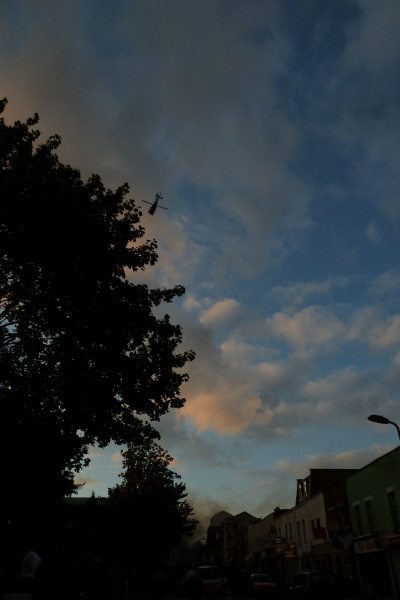As even Britain's kleptocratic party leaders have now been forced to admit, various modes of corruption and anti-social criminality are not confined to gangs or underclasses.
Context
There's no shortage of overt and covert political and cultural criticism in my work (even some of my music reviews) but I don't generally write direct commentaries on political events. However, witnessing the rioting almost on my doorstep and following the ensuing debates has prompted me to change that.
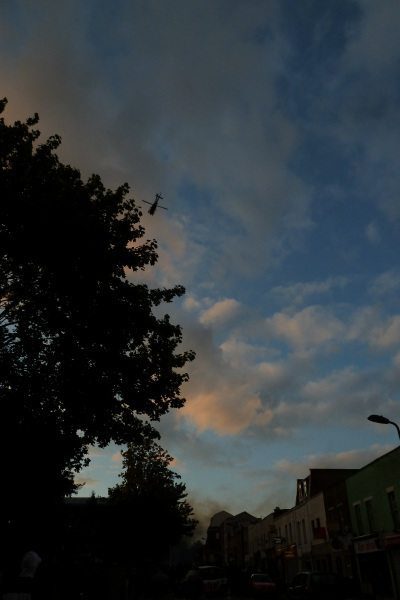 There has been much talk about how the rioters are victims of a hyper-consumerist kleptocratic system in which expropriation is a scarcely hidden norm. However, far fewer people are prepared to see them not just (or at all) as victims, but as advocates of this. I find myself in the uncomfortable position of agreeing with swivel-eyed Thatcherite reactionaries that this isn't (primarily) a protest against but (contrary to what they claim) a militant emulation of the kleptoculture all “mainstream” British political parties have helped enforced and promote over the last three decades.
There has been much talk about how the rioters are victims of a hyper-consumerist kleptocratic system in which expropriation is a scarcely hidden norm. However, far fewer people are prepared to see them not just (or at all) as victims, but as advocates of this. I find myself in the uncomfortable position of agreeing with swivel-eyed Thatcherite reactionaries that this isn't (primarily) a protest against but (contrary to what they claim) a militant emulation of the kleptoculture all “mainstream” British political parties have helped enforced and promote over the last three decades.
As even Britain's kleptocratic party leaders have now been forced to admit, various modes of corruption and anti-social criminality are not confined to gangs or underclasses. These politicians are at the very least institutionally hypocritical, if not institutionally corrupt. Yet it is highly unlikely that their talk of moral regeneration and end to the culture of impunity will be applied across the social spectrum.
The leaders of Britain's auto-privatised and comprehensively self-subverted “Captive State” are mentally incapable even of seeing Thatcherite policies as a problem, let alone of summoning the will or reclaiming the already surrendered power to begin to de-corporatise British society and culture. Like many on the Left they are also incapable of admitting the extent to which feral elite kleptocracy breeds feral street Thatcherism of the type I saw last week.
Notions such as “the new Hackney” have been exposed as consensual illusions between self-deceiving optimists, developers and hipsters which would be swept away without increasingly forceful protection. My argument is that although institutional corruption and aggressively enforced social inequality are socially catastrophic, recent events are definitely a symptom rather than a cure. In short, this was not an insurrection but a kleptocratic insurgency almost as insidious and malevolent as its corporate equivalents' subversion of the public sphere.
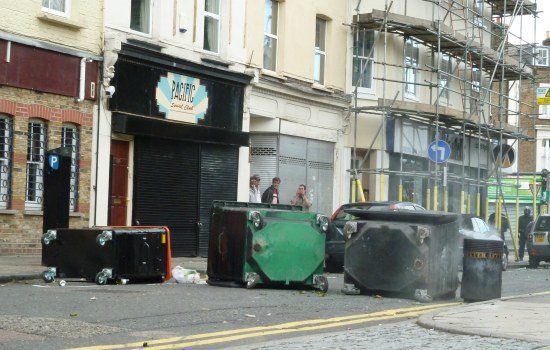 Reality
Reality
When you hear parents boast about their gang membership while dropping their kids of at school, you know something is very wrong.
Perhaps the best way for those on “the Left” to question Pavlovian sympathy for the protagonists is to examine the questions in the light of Thatcherism, because these people (or at least their parents) are both the victims and the most fanatical shock troops of what could be called “the no such thing as society”.
What we're actually witnessing is the obscene core of Thatcherite enjoyment stripped of the nationalist/moralist shell used to legitimate it: this is Ultra-Thatcherite Ultra-Violence, a combined love of materialist individualism and reactionary violence (often underpinned by racist, homophobic and sexist attitudes towards others).
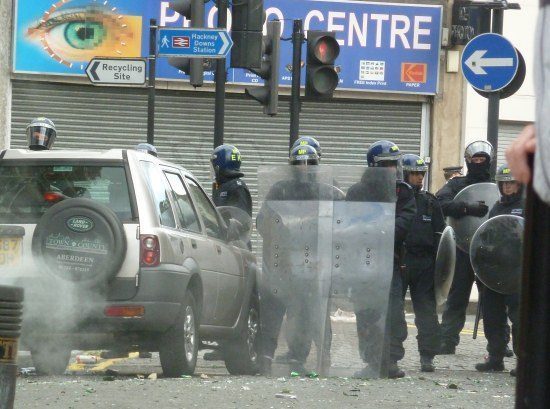 As an Anarchist group stated (at the cost of severe criticism), much of this was violence directed against working people and their homes and they even argued that “Tonight and for as long as it takes, people should band together to defend themselves when such violence threatens homes and communities.” It is true that the self-destructive terrorising of people's own “communities” is partly the result of very effective divide and rule tactics and a cultural-moral bestialisation carried out by the same Tabloids now advocating harsh retribution.
As an Anarchist group stated (at the cost of severe criticism), much of this was violence directed against working people and their homes and they even argued that “Tonight and for as long as it takes, people should band together to defend themselves when such violence threatens homes and communities.” It is true that the self-destructive terrorising of people's own “communities” is partly the result of very effective divide and rule tactics and a cultural-moral bestialisation carried out by the same Tabloids now advocating harsh retribution.
It is also true that it takes place in a context of what Tottenham M.P. David Lammy describes as “bankers getting away with murder”, brazenly looting national treasuries and subverting/coercing entire countries and populations. Then there is also the systematic privatisation and kleptocratisation of consciousness initiated under Thatcher and intensified under Blair, policies which New Labour's Lammy supported, at least by default. Certainly, it's not just the insurgents and serial offenders who've been allowed to feel that their rights outweigh responsibilities and that their actions have no consequences.
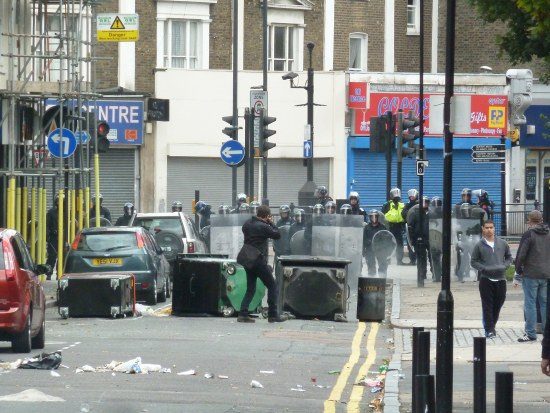 The new consumerist insurgents are also practitioners of what 1980s critics of Thatcherism used to term “private wealth, public squalor.” Leave a trail of spit along the street, damage your surroundings and do all you can to further degrade your environment while filling your own space with luxuries acquired by any means necessary.
The new consumerist insurgents are also practitioners of what 1980s critics of Thatcherism used to term “private wealth, public squalor.” Leave a trail of spit along the street, damage your surroundings and do all you can to further degrade your environment while filling your own space with luxuries acquired by any means necessary.
The hardcore adherents of both groups share a contempt for the public and the social. Yet the fact that they're following the example of defiant criminality set by the City doesn't mean they shouldn't also be opposed. The two act hand in hand against the social and against anti-materialistic forces. One of the influences on the current situation is an active corporate-criminal/criminal-corporate synergy, both in terms of corporate links with “the underworld” and especially culturally. On August 14th The Independent reported:
Adidas will next week launch an advertising campaign featuring rapper, gang member and convicted criminal Snoop Dogg. The Adidas Originals advert also stars fellow US rapper Big Sean, who was charged with sexual assault last week.
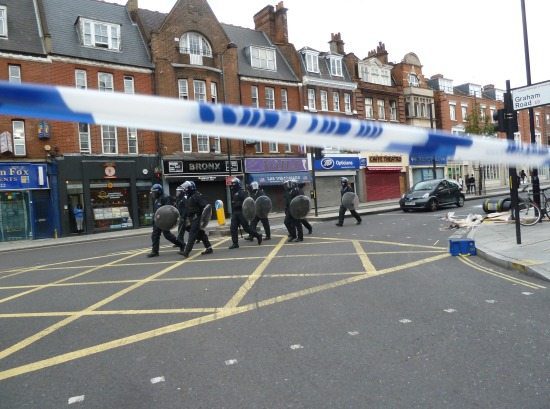 Although some of the sports and even luxury brands favoured by the insurgents are now embarrassed and trying to retreat from the gang chic they've done so much to create, it remains the case that corporate culture and criminal culture are often largely indistinguishable, the one desperately chases the other in an attempt to capture its prestige.
Although some of the sports and even luxury brands favoured by the insurgents are now embarrassed and trying to retreat from the gang chic they've done so much to create, it remains the case that corporate culture and criminal culture are often largely indistinguishable, the one desperately chases the other in an attempt to capture its prestige.
The old Leftist idea about “false consciousness” is still surprisingly prevalent but in this case it's a dangerous illusion. The hardcore carrying out these actions aren't passive victims of “false consciousness” but militants of true kleptocratic consciousness. To put it another way we could ask What is their ultimate utopia? It's hard not to conclude that the answer is anti-cultural gang-dominated society based on the rule of force and commodity. “Progressives” desperately trying to dress this up as a protest ought to be careful what they wish for the victory of: these are lethal allies who'd be more than happy to eradicate them given the chance.
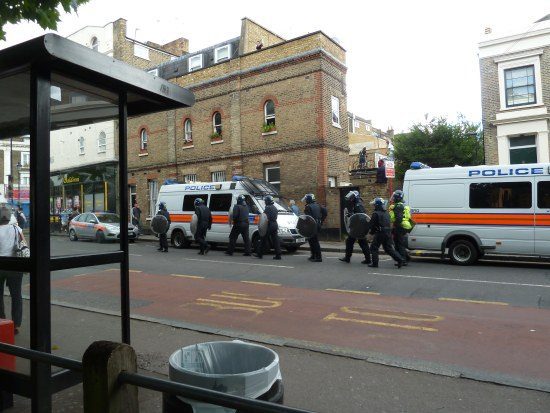 There's an acute and embarrassing contrast to the protests in Madrid. No teach-ins or speeches here: just proudly inarticulate Ultra-Thatcherite Ultra-Violence driving unfocussed alienation. It's true that those who might organise such protests have been quite effectively deterred by the knowledge that the Police are likely to use excessive force against them much sooner than against tooled-up gang members.
There's an acute and embarrassing contrast to the protests in Madrid. No teach-ins or speeches here: just proudly inarticulate Ultra-Thatcherite Ultra-Violence driving unfocussed alienation. It's true that those who might organise such protests have been quite effectively deterred by the knowledge that the Police are likely to use excessive force against them much sooner than against tooled-up gang members.
It's very interesting that as far as I know that apart from cases of online incitement there were no “pre-crime” arrests last week as there were against peaceful protesters planning to leave their mark on the royal wedding celebrations in April: a telling difference. In any case, last week's events have provided a perfect excuse for much greater securitisation and a far more intensive deterrence of democracy as a systemically beneficial by-product.
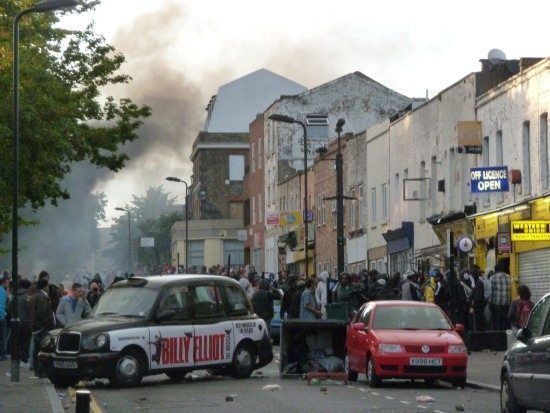 It's often said that in the Imperial era Britain used to send its restless youth abroad to terrorise other populations and arguably the most ultra-violent are the symbolic descendants of the Black and Tan paramilitary forces scraped together to enforce loyalty during the Irish War of Independence.
It's often said that in the Imperial era Britain used to send its restless youth abroad to terrorise other populations and arguably the most ultra-violent are the symbolic descendants of the Black and Tan paramilitary forces scraped together to enforce loyalty during the Irish War of Independence.
The difference is that there is no clear enemy for the “authorities” to unleash them against and since the antagonism generated by social conditions, the Grand Theft Auto culture and gang machismo has to find an outlet they turn on those around them and the wider society. Yet many still try to deny the Gang factor entirely, just as the Right tries to ignore the social context.
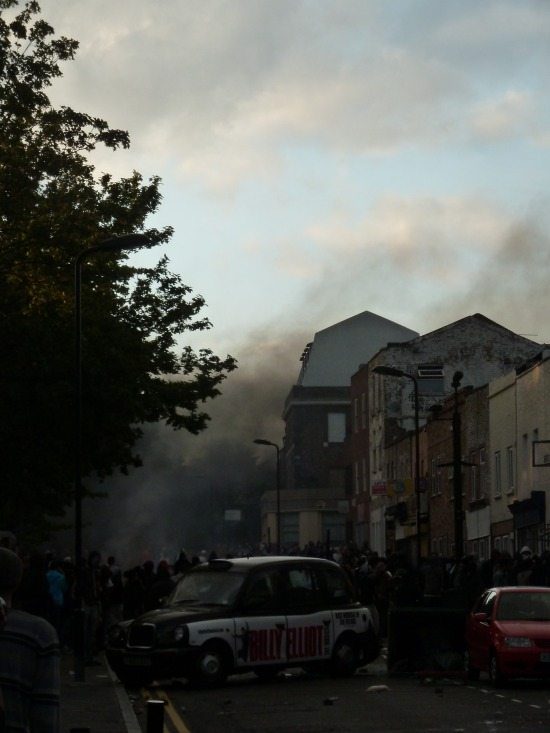 Another parallel I can't ignore is with the actions of Serbian paramilitaries in the 1990s. Both share a commitment to culturecide. The burning of libraries, colleges and homes are all ominously familiar to those who followed the collapse of Yugoslavia. If anyone thinks the Serbian paramilitary analogy is excessive they might also want to consider the growing popularity of gang rape in Britain. This aspect is important when considering those who cheered on the insurgents last week. Although the groups we saw last week operate in a highly mobile way and tend not to stay in one place for too long, there is evidence that some were directed by gang members and it's hard not to conclude that were they to successfully occupy and hold an area a more general reign of terror might have ensued.
Another parallel I can't ignore is with the actions of Serbian paramilitaries in the 1990s. Both share a commitment to culturecide. The burning of libraries, colleges and homes are all ominously familiar to those who followed the collapse of Yugoslavia. If anyone thinks the Serbian paramilitary analogy is excessive they might also want to consider the growing popularity of gang rape in Britain. This aspect is important when considering those who cheered on the insurgents last week. Although the groups we saw last week operate in a highly mobile way and tend not to stay in one place for too long, there is evidence that some were directed by gang members and it's hard not to conclude that were they to successfully occupy and hold an area a more general reign of terror might have ensued.
This might well have included not just further house burnings and murders but rape and torture. Of course the difference is that while Arkan and other warlords might have been happy to recruit and deploy criminals and sociopaths there was some kind of national/ideological framework around the “sheer criminality.” Their new British counterparts are far more honest in the way they act purely for the sake of the act itself: the only “framework” being more violence, more power and more possessions.
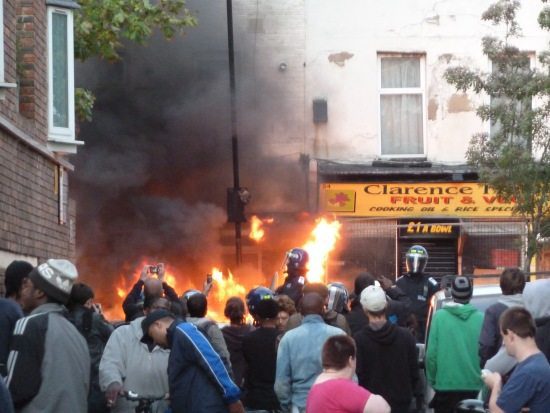
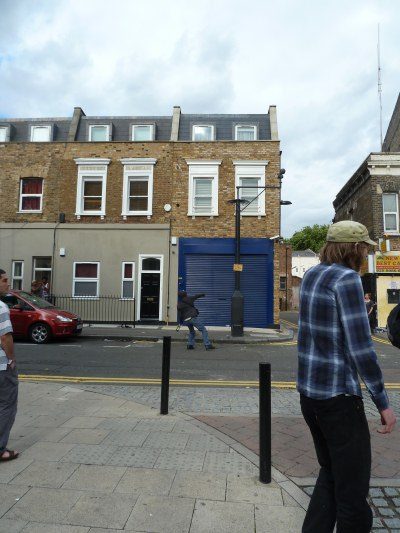 There's a kind of pincer movement between culturecidal gangs and government cuts which acts very effectively to deter and negate culture. A library and a college were both destroyed last week, plus the PIAS distribution warehouse containing the stock of many independent labels (in the latter case the arsonists probably weren't aware of what was in the building but it's still a culturecidal act). It's also hard to imagine them shedding any tears over the loss of a musician's life's work in Croydon.
There's a kind of pincer movement between culturecidal gangs and government cuts which acts very effectively to deter and negate culture. A library and a college were both destroyed last week, plus the PIAS distribution warehouse containing the stock of many independent labels (in the latter case the arsonists probably weren't aware of what was in the building but it's still a culturecidal act). It's also hard to imagine them shedding any tears over the loss of a musician's life's work in Croydon.
To a (feral street) Thatcherite any culture that isn't of the street is anathema and suitable only for destruction. When the MOMART warehouse burned down in 2004 there was much populist rejoicing and a link can be made between the culturecidal impulses of both the insurgents and Thatcherised “Middle England”. In fact, comparing the reactions to the two events we can see how English “common sense” is far more outraged by the burning of shops than by the mass destruction of art – given a chance it's easy to imagine plenty of new East End galleries being destroyed in another wave of temporary autonomous ultraviolence. Middle English philistinism and aggressively primitivist gang culture have much more in common than either side is ever likely to admit.
England is a passively reactionary, corrupt, inefficient and systematically unjust country and yet these events ought also to remind people that much social misery and degradation is self-inflicted and rigorously enforced via self-stupefaction, anti-education attitudes and corporate/gang peer pressure. Many “have no stake in society” because they have no interest in such and ultimately they do not recognise society, except as a disrespectful obstacle to the enactment of their desires.
While I don't want to stress it as much as other commentators have (repeatedly) done, it's important not to overlook not just the gangs but the range of social backgrounds involved. Whatever else they were, these weren't starving wretches in rags and some of the leaders (or provocateurs) seem to drive pretty expensive cars. The ensuing crackdown means that if the economy deteriorates much more dramatically in future then people will find it much harder to protest when they really are desperate.
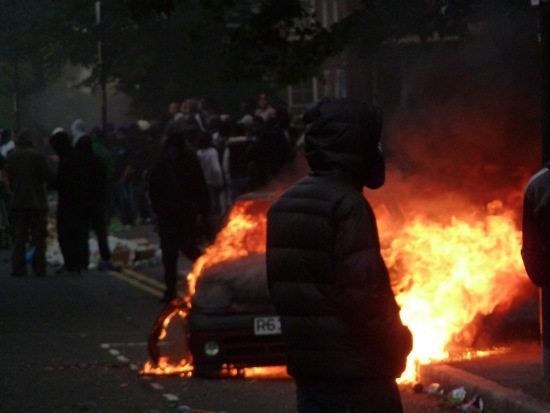 Futures
Futures
So what are the results of what the Right is trying to spin as entirely apolitical and criminal and what the parts of the Left are trying to recuperate as heroic rebellion? Apart from the lost lives and re-stigmatised areas we have intensified social and racial division, open talk of militarisation, the perfect excuse for greater securitisation, even more aggressive pre-emptive suppression of justified protest… If this was a “great leap forward” rather than a surreal interlude it was a leap towards twin dystopian futures.
In the late 1990s the Scottish writer Paul Johnston released a remarkable quartet of novels set in the fragmented remains of the “United Kingdom”. He sketched a picture of widespread social and political collapse, caused largely by a series of internecine local wars started by local drug gangs fighting for supremacy against themselves and an ever weaker central state. In the books dystopian authoritarian city states have emerged in Edinburgh, Oxford and elsewhere, surrounded by anarchic gang-controlled wastelands.
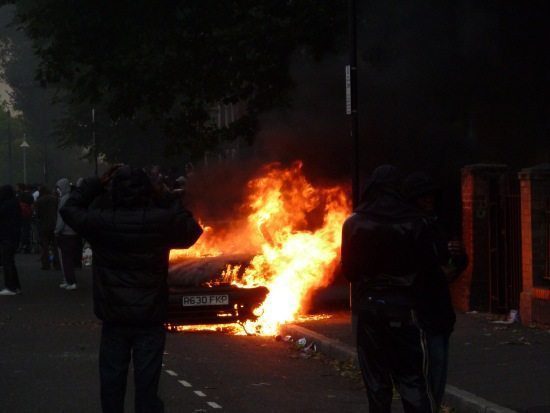 It's clear that the slow process of post-colonial implosion I first discussed several years ago has accelerated. The already tottering corporate state structure has been badly shaken. The question is what will emerge from the implosion of the post-Imperial state: authoritarian reaction, a vanishingly unlikely democratic/civic renaissance or more temporary ultra-violent zones and a messy, agonising descent towards gang and/or corporate authoritarian rule.
It's clear that the slow process of post-colonial implosion I first discussed several years ago has accelerated. The already tottering corporate state structure has been badly shaken. The question is what will emerge from the implosion of the post-Imperial state: authoritarian reaction, a vanishingly unlikely democratic/civic renaissance or more temporary ultra-violent zones and a messy, agonising descent towards gang and/or corporate authoritarian rule.
Postscript
While ultra-violent ultra-Thatcherism has to be opposed, by force if necessary, this doesn't mean that there aren't some constructive measures that can be taken to ameliorate extreme social tensions (“reformist” as these may be). Aggressive gentrification shouldn't continue in the way that is has up until now. Building shiny (though often shoddily constructed) blocks feet away from festering estates isn't good politics, economics or morality. Where richer incomers are parachuted into an area it should be in a way that everyone benefits from in a more tangible way than the largely mythical trickle-down effect).
Conspicuous displays of wealth are provocative and raise tensions further. As well as reserving more flats within developments for social housing, developers should have to enhance the neighbourhood: sponsoring a youth club, paying for improved transport, paying to beautify an existing estate. This might do something to lessen the simmering contempt between new and old Eastenders but even a small reformist measure like this would require an assertion of political or community authority over market forces: don't hold your breath.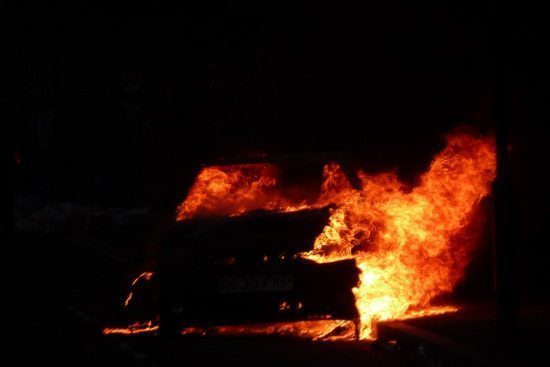
References:
1. http://www.panmacmillan.com/displayPage.asp?PageID=3527
2. http://www.labourlist.org/from-optimist-to-pessimist
3. http://libcom.org/news/north-london-solfeds-response-london-riots-09082011#new
4. http://www.guardian.co.uk/uk/2011/aug/12/uk-riots-gangster-chic-brands
5. http://www.independent.co.uk/news/uk/crime/gang-rape-is-it-a-race-issue-1711381.html
6. http://www.guardian.co.uk/uk/2011/aug/14/flautist-carla-rees-croydon-riot
7. http://www.guardian.co.uk/artanddesign/2004/jun/05/art.britartfire

From Speak and Spell to Laibach.

